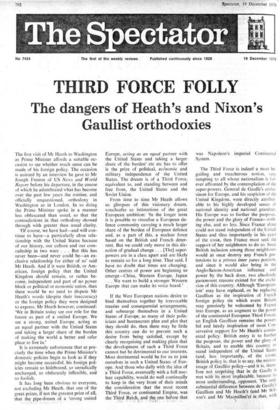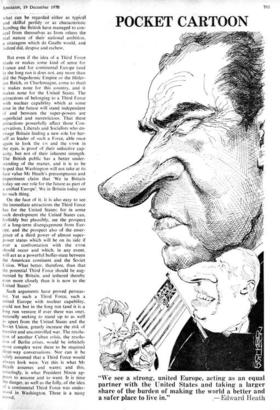THIRD FORCE FOLLY
The dangers of Heath's and Nixon's Gaullist orthodoxies
The first visit of Mr Heath to Washington as Prime Minister affords a suitable oc- casion to see whether much sense can be made of his foreign policy. The occasion is assisted by an interview he gave to Mr Joseph Fromm of US News and World Report before his departure, in the course of which he adumbrated what has become over the past few years the routine, and officially unquestioned, orthodoxy in Washington as in London. In so doing the Prime Minister spoke in a manner less obfuscated than usual, so that the contradictions in that orthodoxy showed through with greater than usual clarity.
`Of course, we have had—and will con- tinue to have—a particularly close rela- tionship with the United States because of our history, our culture and our com- radeship in two wars . . . But this has • never been'--and never could be—an ex- clusive relationship for either of us' said Mr Heath. And if it were British, or Am- erican, foreign policy that the United Kingdom should remain, or rather be- come, independent and part of no power block or political or economic union, then there would be no need to dispute Mr Heath's words (despite their inaccuracy) or the foreign policy they were designed to express. Mr Heath however, continued: 'We in Britain today see our role for the future as part of a unified Europe. We see a strong, united Europe, acting as an equal partner with the United States and taking a larger share of the burden of making the world a better and safer place to live in.'
It is extremely unfortunate that at pre- cisely .the time when the Prime Minister's domestic policies begin to look as if they might become successful, his foreign pol- icies remain so hidebound, so unradically unchanged, so obdurately inflexible, and so foolish.
It has long been obvious to everyone, not excluding Mr Heath, that one of the great prizes, if not the greatest prize of all, that the pipe-dream of a 'strong united Europe, acting as an equal partner with the United States and taking a larger share of the burden' etc etc has to offer is the prize of political, economic and military independence of the United States. The dream is of a Third Force, equivalent to, and standing between and free from, the United States and the Soviet Union.
From time to time Mr Heath allows us glimpses of this visionary dream. vouchsafes us intimations of the great European ambition: 'In the longer term it is possible to visualise a European de- fence community carrying a much larger share of the burden of European defence and as a part of this, a nuclear force based on the British and French deter- rent. But we could only move in this dir- ection of gradual change . . . [The] super- powers are in a class apart and are likely to remain so for a long time. That said, I have no doubt that times are changing. Other centres of power are beginning to- emerge—China, Western Europe, Japan . . . We want to build a stronger Western Europe that can make its voice heard.'
If the West European nations desire to bind themselves together by irrevocable treaties and consequential arrangements, and submerge themselves in a United States of Europe, as many of their polit- icians and bureaucrats plan and plot that they should do, then there may be little this country can do to prevent such a desire from being satisfied, except by clearly recognising and making plain that the development of such a Third Force cannot but be detrimental to our interests. Most detrimental would be for us to join ourselves in such a United States of Eur- ope. And those who dally with the idea of a Third Force, eventually with a full nuc- lear capability, would do well continually to keep in the very front of their minds the consideration that the most recent Third Force, or continental Empire, was the Third Reich, and the one before that • was Napoleon's imperial Continental System.
The Third Force is indeed a most be- guiling and treacherous notion, wry tempting to all whose nationalism is for- ever affronted by the contemplation of the super-powers. General de Gaulle's enthu- siasm for Europe, and his suspicion of the United Kingdom, were directly attribut- able to his highly developed senses of national identity and national grandeur. His Europe was to further the purposes, the power and the glory of France—noth- ing else, and no less. Since France alone could not stand independent of the United States and (less importantly in his eyes) of the USSR, then France must seek the support/of her neighbours to do so. Since British inclusion among those neighbours would at once destroy any French pre- tensions to a prinius inter pares position, and since it would also bring in the Anglo-Saxon-American influence and power by the back door, two absolutely paramount reasons existed for the exclu- sion of this country. Although 'European- ism' may have replaced, or be replacing Gaullism as the inspiration of French foreign policy (in which event Britain may genuinely be welcomed by France into Europe, as an augment to the power of the continental European Third Force). an English Gaullism remains the power- ful and heady inspiration of most Con- servative support for Mr Heath's contin- ental policy. British entry is to further the purposes, the power and the glory of Britain, and to enable this country to stand independent of the United States (and, less importantly, of the USSR). British policy is, that is to say, the mirror- image of Gaullist policy—and it is, there- fore not surprising that in de Gaulle it met with its most implacable, because its most understanding, opponent. The only substantial difference between de Gaulle's Gaullism and Mr Heath's (and Mr Wil- son's and Mr Macmillan's) is that, with what can be regarded either as typical and skilful perfidy or as characteristic humbug the British have managed to con- ceal from themselves as from others the real nature of their national ambition, a stratagem which de Gaulle would, and indeed did, despise and eschew.
But even if the idea of a Third Force made or makes some kind of sense for France and for continental Europe (and in the long run it does not, any more than did the Napoleonic Empire or the Hitler- ian Reich, or Charlemagne, come to that) it makes none for this country, and it makes none for the United States. The attractions of belonging to a Third Force with nuclear capability which at some time in the future will stand independent of and between the super-powers are superficial and meretricious. That these attractions powerfully affect those Con- servatives, Liberals and Socialists who en- visage Britain finding a new role for her- self as leader of such a Force, able once again to look the us and the USSR in the eyes, is proof of their seductive cap- acity, but not of their inherent strength. The British public has a better under- standing of the matter, and it is to be hoped that Washington will not take at its face value Mr Heath's presumptuous and impertinent claim that 'We in Britain today see our role for the future as part of a unified Europe'. We in Britain today see no such thing.
On the face of it, it is also easy to see the immediate attractions the Third Force has for the United States: for in some such development the United States can, foolishly but plausibly, see the prospect of a long-term disengagement from Eur- ope, and the prospect also of the emer- gence of a third power of almost super- power status which will be on its side if ever a confrontation with the USSR should occur and which, in any event, will act as a powerful buffer-state between the American continent and the Soviet Union. What better, therefore, than that the potential Third Force should be aug- mented by Britain, and tethered thereby even more closely than it is now to the United States?
Such arguments have proved persuas- ive. Yet such a Third Force, such a united Europe with nuclear capability, could not but in the long run (and it is a long run venture if ever there was one), naturally seeking to stand up to as well as apart from the United States and the Soviet Union, greatly increase the risk of massive and uncontrolled war. The resolu- tion of another Cuban crisis, the resolu- tion of Berlin crises, would be infinitely more complex were there to be required three-way conversations. Nor can it be safely assumed that a Third Force would always look west. Yet this is what Mr Heath assumes and wants: and this, amazingly, is what President Nixon ap- pears to assume and to want. It is time the danger, as well as the folly, of the idea of a continental Third Force was under- stood in Washington. Three is a nasty crowd.
POCKET CARTOON
"We see a strong, united Europe, acting as an equal partner with the United States and taking a larger share of the burden of making the world a better and a safer place to live in." .—Edward Heath







































 Previous page
Previous page